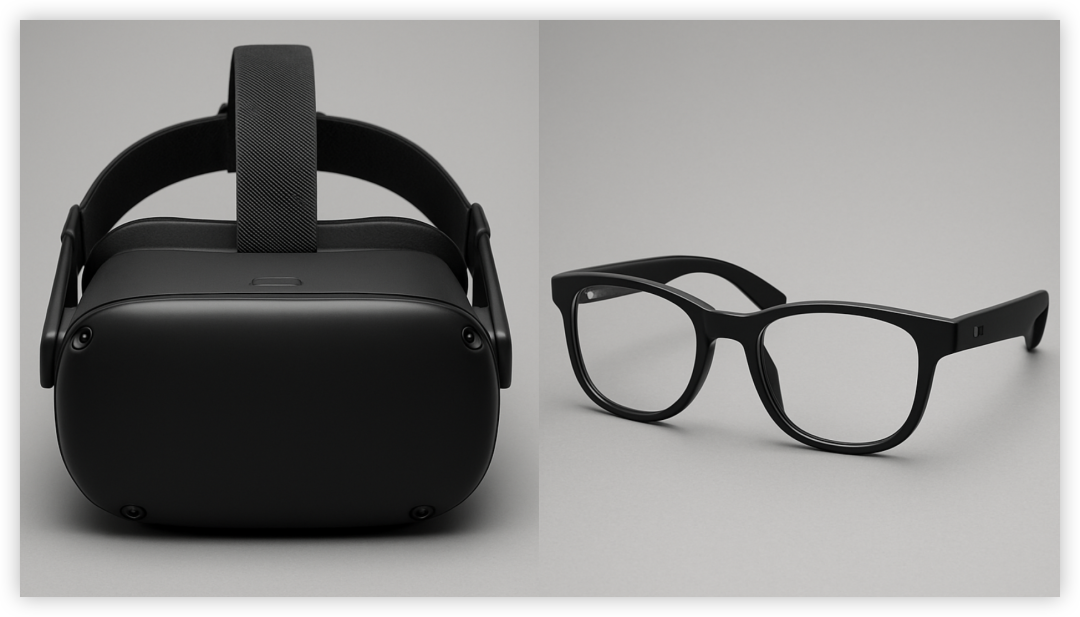From Bulky Helmets to Lightweight Glasses: The New VR Thinking Behind Meta's Strategic Transformation

Introduction: When Tech Giants Slow Down
The tech world is buzzing - Meta suddenly announced postponing Quest 4's release to 2027, instead prioritizing the launch of the ultra-lightweight headset codenamed "Puffin" in 2026. This news came like a bolt from the blue, leaving VR enthusiasts both confused and excited. Is this a forced move due to technical bottlenecks, or is there a bigger game afoot?
Core Points Analysis
-
Form Revolution: Puffin weighs less than 110 grams, adopting a glasses form factor + modular design
-
Positioning Transformation: Shifting from gaming device to virtual productivity tool
-
Ecosystem Expansion: Third-party manufacturers (ASUS/Lenovo) taking over the gaming market
-
Market Strategy: Proactive change in response to Quest sales decline
In-depth Analysis: Why Puffin Could Disrupt the Industry
Design Philosophy: Subtraction Aesthetics
The description of "like a thick pair of glasses" is already eye-catching. Through:
-
Removing external battery and processor (using modular "compute button")
-
Eliminating traditional controllers (using Vision Pro-style eye tracking + gesture interaction)
-
Extreme lightweight material application
This combination directly addresses the core pain point of existing VR devices being "too heavy and clumsy."
Usage Scenarios: Redefining VR Value
Meta clearly positions Puffin as:
-
Mobile multi-screen office solution
-
Portable HD entertainment system
-
All-day wearable device
Compared to Quest series' emphasis on gaming attributes, this move shows Zuckerberg's fundamental shift in understanding the "metaverse."
Supply Chain Wisdom: Leveraging Strength
By opening Horizon OS to third-party manufacturers:
-
ASUS ROG continues to focus on gaming niche market
-
Lenovo may target professional fields
-
Meta concentrates resources on consumer-grade lightweight breakthrough
This "divide and conquer" strategy both maintains existing users and allows for light-footed exploration of new blue oceans.
Industry Impact: Butterfly Effect Emerging
-
Technology Route: Modular design may become new standard
-
Content Ecosystem: Productivity tools will enter explosive period
-
Competitive Landscape: Direct competition with Apple Vision Pro
-
User Habits: From "occasional use" to "all-day wear"
Particularly interesting is that just before announcing the Puffin plan, Reality Labs released quarterly revenue down 6%. This seemingly passive adjustment might hide deeper intentions of active transformation.
Professional Perspective: Risks and Opportunities Coexist
According to Meta CTO's disclosed hardware development process:
-
Puffin should currently be in "engineering validation testing" phase
-
Historical data shows 50% elimination rate
-
Final product may differ significantly from current leaks
Consumers need to maintain rational expectations, but industry practitioners can already discern three clear signals:
-
VR devices are undergoing qualitative change from "toys" to "tools"
-
Comfort is beginning to take priority over performance parameters
-
Usage scenarios are breaking through traditional time and space limitations
Conclusion: Lighter Weight, Heavier Responsibility
When Meta chooses to temporarily set aside its gaming market achievements to pursue a VR dream that can fit in a pocket, this is both a transcendence of existing products and a return to original intentions - making technology truly "disappear" in daily life. Whether Puffin can become VR's "iPhone moment" remains to be seen, but it at least proves: sometimes subtraction is the greatest innovation.
分享文章
3篇相关文章
The Merc with a Mouth Returns! Deadpool VR Coming to Meta Quest 3 Platform!
2025-06-09
Hey Marvel fans and VR enthusiasts, is your adrenaline ready? The most irreverent superhero ever - Deadpool, is coming to Meta Quest 3 to stir things up! This time he's directly 'crossing over' into the VR world, ready to take us on an unprecedented hilarious adventure.
Meta Quest Hand Tracking 2.4: Your Hands Finally Keep Up With Your Brain in VR
2025-12-18
Meta Quest’s Hand Tracking 2.4 update supercharges the high-speed mode for smoother, more accurate gesture control. Here is a deep dive into its three core technical upgrades and what they mean for VR immersion.
No More Poking Virtual Keyboards: VR Finally Gets a Truly Satisfying Input Upgrade
2025-12-18
Typing in VR has always been a pain. The upcoming Yap voice keyboard lets you ‘talk’ your way through everything in virtual worlds.